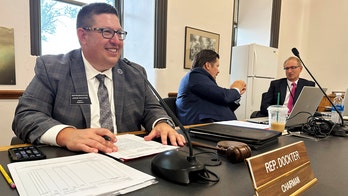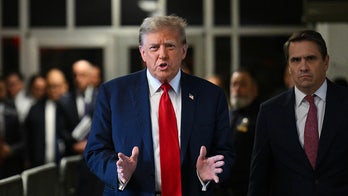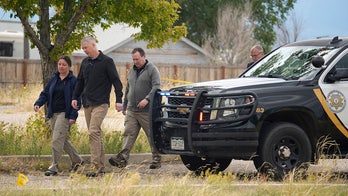U.S. senators -- generally known for their verbosity -- let Sonia Sotomayor get in a word edgewise Tuesday as the judge sought to justify her confirmation to the Supreme Court.
Sotomayor entered her first day of questioning facing 19 Judiciary Committee senators -- 12 Democrats and seven Republicans -- who all had a point to make about the federal appellate judge's judicial record.
But rather than just speechifying, the lawmakers, who were designated 30 minutes each for questions, dispensed with the long-winded personal declarations that turned the previous day of the vaunted hearing into a showcase for America's biggest talking heads.
As it turned out, the willingness of senators to recede and let Sotomayor speak often ended up giving lawmakers the answers they wanted to hear.
Supporters found the judge to be "a very steady, scholarly, intelligent judge," as Sen. Dianne Feinstein, D-Calif., one of the most talkative lawmakers, described the judge, while critics found her answers troubling, particularly as they related to her revising her "wise Latina" remark in a 2001 speech she gave at the University of California Berkely.
"Don't become a speech writer if this law thing doesn't work out because these speeches throw a wrinkle into everything," Sen. Lindsey Graham, R-S.C.
Graham, however, said so far as he's heard, he's not been dissuaded by Sotomayor's answers.
"I like you, by the way, for whatever that matters. Since I may vote for you, that ought to matter," he said.
But even as Sotomayor offered her answers, she also had to listen to a barrage of bluster.
"I must say that, if there's a test for judicial temperament, you pass it with an A-plus-plus," Feinstein told Sotomayor.
Throughout Tuesday's nine-hour Q&A, GOP lawmakers mostly peppered Sotomayor with rapid-fire questions, trying to draw her into a trap, while Democrats set the table for a likely confirmation, offering long defenses of Sotomayor garnished with a few bland inquiries.
Sen. Patrick Leahy, D-Vt.
Senator Leahy spoke approximately 17 minutes, while Judge Sonia Sotomayor spoke just under 13 minutes. They spent over half the time, approximately 16 minutes discussing Judge Sotomayor's decision in the reverse discrimination case of Ricci vs. Destefano, a case that was later overturned in a 5-4 ruling by the U.S. Supreme Court.
Sen. Jeff Sessions, R-Ala.
Senator Sessions spoke for just over 16 minutes of the time, giving Judge Sotomayor just over 13 minutes to answer his questions. Senator Sessions devoted the first half of his questioning to Sotomayor's past controversial statements on whether a "wise Latina woman" was better qualified to make a legal decision than a white male. Senator Session then moved on to discuss the case of case of Ricci vs. Destefano.
Sen. Herb Kohl, D-Wis.
Senator Herb Kohl only spoke for approximately 10 minutes, leaving the bulk of the time, approximately 17 minutes, for Judge Sotomayor to have the floor. Senator Kohl began with questions Sotomayor's ability to judge with an impartiality, pressing her on the proper role of a judge. Senator Kohl then proceeded to touch on a wide range of other issues, including asking Sotomayor which current Justices she admires, would she support allowing cameras inside the Supreme Court, and affirmative action.
Sen. Orrin Hatch, R-Utah
Senator Orrin Hatch's allotted 30 mins was split very evenly, with the Senator speaking for approximately 14 minutes and Judge Sotomayor speaking for just over 13 minutes. Senator Hatch dedicated the majority of his time to tough questioning on the Second Amendment Right to Bear Arms and Sotomayor's past rulings on the controversial issue. During the last ten minutes of his allotted time, Senator hatch raised questions over Sotomayor's ruling in the case of case of Ricci vs. Destefano.
Sen. Feinstein, D-Calif.
Senator Feinstein questioned Judge Sotomayor on a broad range of issues, allowing the Supreme Court nominee to have the floor for over 15 minutes, herself speaking for about 13 minutes. Senator Feinstein focused first on the case of Ricci vs. Destefano, before turning to a broad list of issues including abortion, legal precedence, national security, and environmental law.
Sen. Chuck Grassley, R-Iowa
Senator Grassley began his allotted 30 minutes of questioning by focusing on property rights before turning to the question of impartial justice and the role of the judge. During his questioning, Senator Grassley took the role of listening, speaking for approximately 12 minutes, and allowing Judge Sotomayor the floor for 18 minutes.
Senator Feingold, D-Wis.
Senator Feingold began his questioning -- during which he spoke for approximately 13 minutes, ceding 15 minutes to Judge Sotomayor -- on the topic of National Security and the limitations of Executive power. During that time, Senator Feingold raised his concerns over legislation passed in the wake of the attacks of September 11th. Sen. Feingold then continued on to discuss the Right to Bear Arms, declaring himself an avid supporter of the 2nd Amendment. He also touched upon Judge Sotomayor's personal background and the importance of accessibility to the law.
Sen. Jon Kyl, R-Ariz.
Senator Kyl spoke for approximately 13 minutes of his allotted 30 minute time, with Judge Sotomayor speaking for approximately 13 minutes. The questioning began on the topic of the Second Amendment Right to Bear Arms before Senator Kyl probed Judge Sotomayor on the role of a judge and the place of empathy in the U.S. court system.
Sen. Chuck Schumer, D- N.Y.
Senator Chuck Schumer spoke for over half the time he was allotted, opening his questioning with a personal defense of Judge Sotomayor's record and refuting claims from his colleagues that federal appellate judge had a record of ruling with empathy. Judge Sotomayor spoke for approximately 13 minutes during the exchange, answering questions on a range of topics including judicial activism, foreign law, and the 1995 baseball strike.
Sen Lindsey Graham, R- S.C.
Senator Lindsey Graham spoke for just over half of the allotted 30 minutes, taking up 16 minutes while Judge Sotomayor spoke for 14 minutes. Senator Graham began voicing concerns over judicial activism, pressing Sotomayor on the role of the United States Constitution. Graham then questioned the judge on her views on abortion, her controversial "wise Latina" comments, and her experience living and working in New York following September 11th.
Sen. Richard J. Durbin, D-Ill.
The last senator, Sen. Durbin, spoke for just over 15 minutes while Sotomayor took up 13 minutes. Sen. Durbin first focused on the Ricci firefighting case and, despite its controversy, commented that it was just one of Sotomayor's 3,000 as a federal judge. Sen. Durbin then centered on the death penalty, commenting that 80 percent of death penalty cases involve victims who are white. Sotomayor responded that the effects of the death penalty, how it should be done, what circumstances warrant it or don't, in terms of the law is a legislative question. The two finished the hearing with views on immigration courts, which Sotomayor said there's always "room for improvement."




